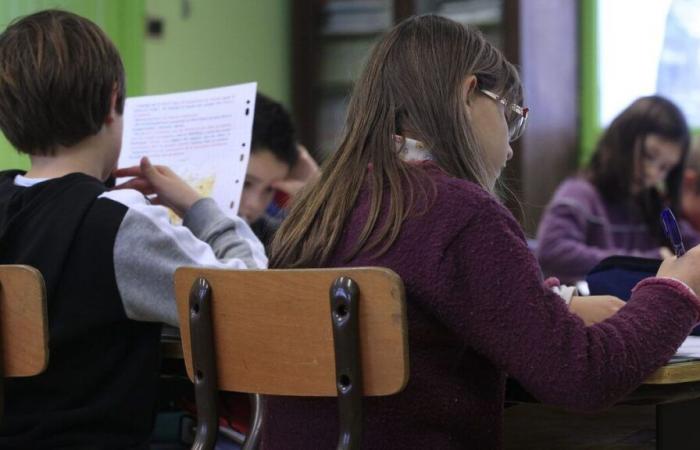Gender inequalities at school persist. Girls perform better on average than boys in French and vice versa for mathematics. Good news, in the first discipline, the gap is narrowing. Bad news, in the second, it gets worse. This is one of the findings of the national assessments of the 6th and 4th grades taken by the students in September, the results of which were published Thursday evening. And “this raises questions”, we summarily warn the Ministry of Education.
Since 2017, the average score of girls in maths when they enter 6th grade has remained stable, while that of boys has progressed. As a result, the gap has widened by seven points in seven years. This development is confirmed through the results of 4th grade students, which have been recorded for two years. Thus, at the start of the 2024 school year, the average score of middle school students was ten points higher than that of middle school girls. They have lost two points in one year, while the boys' level has not fallen. Furthermore, more girls belong to the less successful group than last year.
However, National Education places emphasis on gender equality. Public discourse today values the promotion of women in scientific careers, represented as a major issue for the country's economy and society in general. So how can we explain that the gap in maths will still widen at school in 2024? “We are trying to tackle this subject, but there is real in-depth work to be done in society: sexism is strong in many areas, including math,” notes Claire Piolti-Lamorthe, president of the Association. of public education mathematics teachers (APMEP).
Dropping out at the age when stereotypes begin
Recent studies, such as the one published in 2022 by French researchers in the British Journal of Developmental Psychology, revealed that the gap occurs as early as halfway through the year of CP. And this before increasing upon entry into CE1, further indicated the Institute of Public Policies (IPP) last January, specifying that all social circles and all types of schools were concerned. In other words, “the dropout occurs at the moment when mathematics is called mathematics and the stereotypes begin,” says Claire Piolti-Lamorthe.
Has this weight of gender clichés increased in recent years? Masculinism is increasing among young people, the High Council for Equality deplored in January, and sexist stereotypes are not immune to this resurgence. “Just look at the latest trend on TikTok, #GirlMath,” points out Mohamed Nassiri, mathematics teacher at a high school in Lille, in reference to the humorous videos of young users who justified non-essential expenses with dubious calculations. “In the end, it reinforces the idea that girls are bad at math. »
Contrary to the wishes displayed by the public authorities, “the system has not put in place the right actions to promote the success of girls in mathematics”, believes the teacher. And the same to say that during the preparation of an Olympiad in computer science, he had been asked to form pairs of girls and boys, which according to him were not very effective in combating already internalized stereotypes. “I realized that all the boys were behind the computers and the girls were writing the reports. When I asked them if it was a joke, both girls and boys explained that it was because girls were more comfortable in that role. »
Lack of examples of known female mathematicians
“Many practices need to be modified,” insists Mohamed Nassiri, who cites in particular the attribution of speech in class – more given to boys according to a 2017 HCE report –, and the gendered comments noted in school report cards. He set up single-sex courses for first year high school girls – “because one in two abandons maths the following year, compared to 30% of boys”.
Above all, the lack of examples of known female mathematicians convinces girls that they are not capable of succeeding in this discipline, which is also mainly taught by men, recalled the specialized site Café Pédagogique in 2022. “We are talking about Thales' theorem , by Pythagoras, but we could also try to celebrate female mathematicians, and there are plenty of them, to give girls a greater sense of belonging,” says Rudy Trevet, maths teacher at a college in Aube.
He identifies another problematic point: “Be careful of the documents and exercises that we give and which convey sexist stereotypes. » Instead of the traditional “mom who does the shopping and has to calculate the return of change”, he now prefers to work on calculations which relate to salary inequalities. “The schoolgirls were happy that we were talking about that! »






